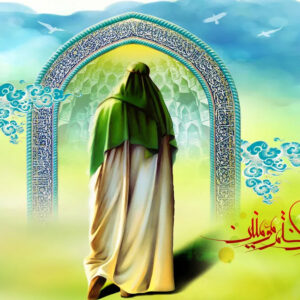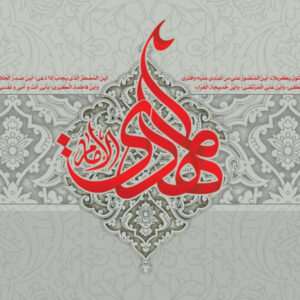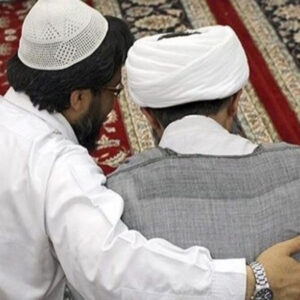Imam Mahdi (as) is the Twelfth Imam as per the belief of the Shiah Ithna Ashari (this is the sects of Islam that believes in the mastership of twelve Imams after the Holy Prophet of Islam (sawa)). He was born on 15th Shabaan 255 AH in Samarrah, Iraq to Imam Hasan Askari (as), the 11th Shiite Imam and Hazrat Narjis Khatoon (as). He is alive till today and in a state of occultation. Allah will cause him to re-appear whenever Allah wishes. After his re-appearance, he will fill the earth with justice and equality. Universal peace will prevail and the word of Allah will be completed.
The Belief of Imam Mahdi (as) in a Universal Belief
The belief in Imam Mahdi (as) is an Islamic belief and not one restricted to the Shiite community. (Read More). Rather it is universal belief which is espoused by Hinduism, Zoroastrianism, Christianity and Judaism.
A series of articles on this web site on the subject of Imam Mahdi (as) will establish the conditions, circumstances and the environment for the belief in Imam Mahdi (as).
What is the Foundation of The Belief of Imam Mahdi (as) in Islam?
Let us go through the sequence of verses of Quran and traditions to understand the belief in the Mahdi.
Aim of Creation
Allah created this us world and sent prophets and messengers for our guidance. Right from Hazrat Adam (as) to Hazrat Mohammed Mustafa (sawa), all prophets and messengers had one aim. To remind people of the Unity of Allah (Tawheed) and guide them to the right worship of Allah. In Surah Jumuah, Allah says, “It is He who has sent among the unlettered a Messenger from themselves reciting to them His verses and purifying them and teaching them the Book and wisdom.” (Surah Jumuah, verse 2)
And the purpose of all of this? Allah says in Quran, “We did not create the humans and the jinn except that they should worship Me.” (Surah Zariyaat, verse 56) The prophets, the messengers were the “authorised” representatives of Allah, His chosen ones who would guide to the right path. The sequence of prophethood was followed by the period of Imamate or Caliphate.
Read More: Recognition of Imam Mahdi (as)
12 Caliphs in Islam
The Holy Prophet (sawa) said that there would be 12 caliphs in Islam. Rather, Islam will not end till the advent of these twelve caliphs. Jabir Ibn Samarah says, “We were with the Prophet (sawa) when he said, “Twelve (Caliphs) will follow this affair (Islam).” The people started screaming due to which I could not hear what he said thereafter. I asked my father, who was closer to the Prophet (sawa) than me, ‘What did the Messenger of Allah (sawa) say?’ He replied, “All of them will be from Quraish and their likes will not be seen.” (Kamaluddin, volume 1, page 272, chapter 24, tradition 21)
This has been reported successively in the books of Ahle Sunnah as well. Masrooq relates that we were sitting with Abdullah Ibn Masood while he was reciting the Quran for us. Somebody asked him, “O Aba Abdur Rahman, did you ask the Messenger of Allah (sawa) how many caliphs will rule this nation?” Abdullah Ibn Masood replied, “Since I have come to Iraq, nobody has asked me this question before you. Yes, we did ask the Messenger of Allah (sawa) and he replied, “Twelve, like the number of chiefs (nuqabaa) of Bani Israel.”
The above tradition can be found in Musnade Ahmad, volume 1, page 398; Kanzul Ummaal, volume 12, page 33, tradition 33857; Muntakhab Kanzul Ummaal, volume 5, page 312; Taarikhal Khulafa, page 7; Majma al-Zawaaed, volume 5, page 190 (The Chapter of Twelve); Al-Mataaleb al-Aaliyah, volume 2, page 196, traditions 2040 and 2041, Al-Durr al-Manthoor by Jalaaluddin al-Suyuti under the Quranic verse, “And We raised amongst them twelve chiefs.” (Surah Maedah, verse 12); Mutashaabehaat al-Quran, volume 2, page 53; Yanaabi al-Mawaddah, page 258; Mustadrak al-Sahihain, volume 4, page 501; Musnad Abi Ya’laa, volume 8, page 444, tradition 65 (5031), volume 9, page 222, tradition 356 (5322)
Who Are The 12 Caliphs?
Regarding the identity of these twelve caliphs, through several events and traditions, Holy Prophet (sawa) emphasised that his successors would be
- Imam Ali Ibne Abi Talib (as). He would be succeeded by his sons,
- Imam Hasan (as) and
- Imam Husain (as). Thereafter the Imamate would continue in the progeny of Imam Husain (as)
- Imam Ali Ibnil Husain (as)
- Imam Mohammed Ibne Ali (as)
- Imam Jafar Ibne Mohammed (as)
- Imam Musa Ibne Jafar (as)
- Imam Ali Ibne Musa (as)
- Imam Mohammed Ibne Ali (as)
- Imam Ali Ibne Mohammed (as)
- Imam Hasan Ibne Ali (as) and finally ending the chain of Imamate through his son,
- Imam Mahdi (as)
These names are recorded for posterity in books of history and traditions of both Shiah and the Ahle Sunnah (as).
For example, we find the tradition – Abdullah Ibn Abbas narrates that the Messenger of Allah (sawa) said, “Surely, my caliphs, my successors and the proofs of Allah upon the creatures after me are twelve. The first of them is my brother and the last is my son.’ He (sawa) was asked, ‘O Messenger of Allah (sawa)! Who is your brother?’ He (sawa) replied, ‘Ali Ibn Abi Talib.’ Again he (sawa) was questioned, ‘And who is your son?’ He (sawa) responded, ‘The Mahdi, who will fill the earth with justice and equality as it would be fraught with injustice and oppression. I swear by the one Who raised me as a giver of glad tidings with truth! If only one day remains for the world to come to an end, Allah will prolong this day till He brings forth in it my son Mahdi. The Spirit of Allah, Isa, the son of Maryam, will descend and pray behind him. The earth will light up with the resplendence of its Lord. His (Mahdi) government will encompass the east and the west.”
The above tradition is found in the book of both the Shiah and the Ahle Sunnah. It has been reported in Faraedus Simtayn, volume 2, page 312, chapter 61, tradition 562; Kamaluddin, volume 1, page 280, chapter 24, tradition 27; Yanaabiul Mawaddah, page 447, chapter 78 (in brief); Ghayatul Maraam, page 692, chapter 141, tradition 6; Beharul Anwar, volume 51, page 71, chapter 1, tradition 12.
Mahdi Is In The Quran. And In Traditions.
The discussion about the Mahdi (as) has been documented in the Quran and traditions. These traditions are quoted extensively in the books of the Shiah and the Ahle Sunnah. Every facet of his personality, of his companions, the circumstances of his birth, long life and reappearance have been documented by traditionalists. A very crude estimate will establish that the discussion of Imam Mahdi (as) will probably rank amongst the top 3 or 5 topics under discussion in Islam.
Read More: Imam Mahdi (as) in Quran | Imam Mahdi (as) in Traditions
Birth Of Imam Mahdi (as)
Imam Mahdi (as) was born on 15th Shabaan 255 AH in Samarrah in the house of Imam Hasan Askari (as). His mother was Janabe Narjis Khatoon (sa). His birth, the news of which hidden from the general public, was witnessed by selected people from the house. Thereafter there were selected companions of Imam Hasan Askari (as) who met Imam Mahdi (as). His birth has been recorded by Shiah and Ahle Sunnah scholars both. (Read More)
Name of Imam Mahdi (as)
The name of the Mahdi is the same name as that of the Holy Prophet (sawa) and his agnomen (kuniyat) is the same as that of the prophet (sawa). He is known by many titles – al-Mahdi, al-Qaem, al-Muntazar, Sahebaz Zaman, Wali al-Asr, Baqiyatullah etc. (Read More)
His Imamate
At the age of 5 years, in 260 AH, his Imamate commenced after the martyrdom of Imam Hasan Askari (as). People witnessed him at the burial of his father, knowing that only an Imam can bury an Imam. Even though his uncle, Jafar Kazzab, attempted to claim Imamate for himself. However he failed miserably.
His Ghaybat
The Ghaybat or occultation of Imam Mahdi (as) commenced in 260 AH. During this period, people can see the Imam (as), but cannot recognise him. The example of this is given in the Holy Quran in the story of Hazrat Yusuf (as)
The minor occultation (Ghaybate’ Sughra) lasted for 69 years during which there were four appointed deputies of the Imam (as).
The minor occultation was followed by the major occultation (Ghaybate’ Kubra) which continues till today. This period of occultation was prophesied by Holy Prophet (sawa) and Imams (as) as a period of tests and tribulations for the Shiahs. During his period, no person can claim to meet the Imam at will. It is possible only with the permission of Imam (as).
Meeting Imam Mahdi (as)
During his occultation, Imam Mahdi (as) has granted some people the opportunity to meet him. Some of these incidents are recorded in the books of history. Imam (as) is on this earth only. He goes for Hajj every year and is in our cities. (Read More)
Long Life of Imam Mahdi (as)
The long life of Imam Mahdi (as) has been a issue for some. Skeptics argue that it is not possible for a human to live as long as the Imam (as) has. The Shiite response is that it is unusual, but not unique. Allah has offered several examples of history, some specifically like Hazrat Khizr (as), so that people would not doubt the long life of Imam Mahdi (as). (Read More)
Reappearance of Imam Mahdi (as)
Imam Mahdi (as) will reappear when Allah wishes. His reappearance will usher in a golden era of justice and equality, in which Islam will be the dominant religion. Allah says, “It is He who sent His messenger with the wisdom and true religion so that He may make it dominant over all other religions, even though the polytheists may be averse to it.” This verse will actualise with the reappearance of Imam Mahdi (as). (Read More)
Our Duties
Believers are having some duties and responsibilities during the period of Ghaybat. They must await the coming of the Mahdi and reform themselves and prepare for his advent in the way that pleases him. (Read More)
Read more about Imam Mahdi (as)
- An Introduction to Imam Mahdi (as)
- Who Is Imam Mahdi (as)?
- Who Are The Parents Of Imam Mahdi (as)
- Need of Recognition Of The Imam Of The Time
- The Earth Will Never Be Devoid of A Divine Proof
- Belief in Imam Mahdi (as) – A Universal Belief
- Shiahs and Ahle Sunnah Both Wrote Books About Imam Mahdi (as)
- Discussion About Imam Mahdi (as) In Traditions
- Abundance of Traditions Regarding Imam Mahdi (as)
- 40 Traditions from Ahle Bayt (as) about Imam Mahdi (as)
- Names And Titles Of Imam Mahdi (as) – Part I
- Names And Titles Of Imam Mahdi (as) – Part II
- Imam Mahdi (as) In Hadithe Qudsi
- 40+ Special Characteristics about Imam Mahdi (as)
- The Belief in Imam Mahdi (as) Was Ingrained in People




